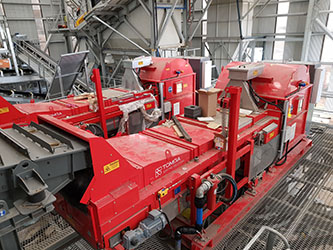2nd Hand Equipment - Coming soon!

We are now putting the final touches to the World Mining Equipment 2nd Hand market place. If you would like information on this service contact


50% owned by Metals X through the Bluestone Mines Tasmania Joint Venture (BMTJV) the Renison Tine Mine is the only major tin project in production in Australia with a mining rate of close to 1Mtpa, although the concentrator is restricted at 750,000tpa. The extreme humidity, with an annual rainfall of over 3,000 mm, and the highly acidic processing water with pH around 4.5, creates unique challenges for the sorting process, the equipment, and waste management, which BMTJV resolved with TOMRA's help.
They approached TOMRA to address two key requirements.
Firstly, the need to upgrade their tin feed to the plant: "The Renison Tin operation wanted to achieve economies of scale, putting more tons through the front end of the plant without upgrading the back end downstream – we wanted to do more with less," explains Ben Wraith, Principal Project Metallurgist at BMTJV.
A team from BMTJV visited the TOMRA Test Center in Sydney, where they observed what the XRT sorter operating at capacity is capable of and experienced first-hand the exceptional accuracy of TOMRA's XRT sensor. "Our XRT stands out for the high spatial and density resolution and its ability to do contrast sorting, identifying fine high-density tin inclusions in the ore with an accuracy that has no equal on the market," says Gavin Rech, Technical Manager at TOMRA.
TOMRA's XRT sorters have proved to be a sound investment that is delivering significant returns: "operating the sorting circuit has slightly increased our overall processing cost, but this is more than offset by the large increase in ROM throughput by 15 to 20%, and thus tin production, so the unit cost per ton of tin produced is reduced by almost 10%," says Ben Wraith.
The second requirement was to address the environmental issue of removing acid-forming sulphides from the waste.
TOMRA's solution addresses the issue of acid forming sulphides in the waste, in that the ROM goes through the two TOMRA XRT sorters, which very effectively recover the tin. TOMRA's XRT sorting technology has a high spacial and density resolution. It is accurate at separating the tin from the acid forming materials. The waste from this process is then fed through the TOMRA EM sorter, which removes the sulphides. The acid waste is transported back underground. The remaining non-sulphide material in the waste is currently stockpiled in a separate storage facility on the surface, while the company explores possible uses, such as geotechnical backfill.
For more information: https://www.tomra.com/en/sorting/mining